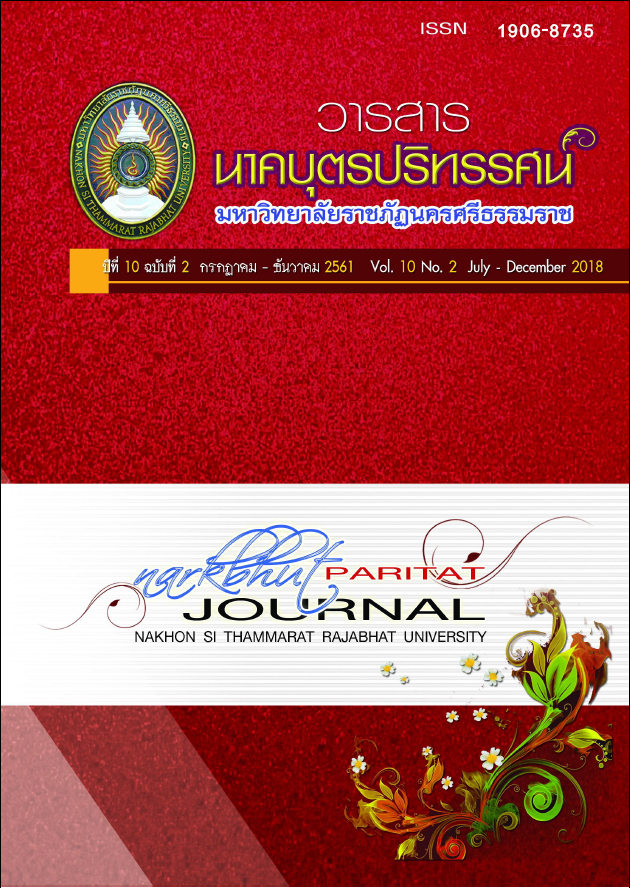คุณภาพชีวิตการทำงานของบุคลากรที่ส่งผลต่อความผูกพันของศูนย์ควบคุมการบิน ส่วนภูมิภาค บริษัท วิทยุการบินแห่งประเทศไทย จำกัด Quality of work life of Personnel of the Regional Aviation Control Center, Radio Thailand Co, Ltd. Affection Their Organization Commitment.
Main Article Content
บทคัดย่อ
Abstract
The purpose of this research wear to : 1) study the quality of life of the employees of the Regional Aviation Control Center, Radio Thailand Co., Ltd., 2) to study the level of personnel Commitment of the regional aviation control center; and 3) to study the relationship of quality of work life and the commitment of Flight the control center.
The samples used in this study and from general information of the 457 respondents the indicated used for gathering of the data is a five scales questionnaire and the respondents and composed of Deputy Directions of the Custer, general administrators an department heads, to totaling 18.
The first set of variables are Those of socioeconomic characteristics composition of set, age, education level, present poste, length of service place of work. Anther set of independent Variables of quality of work life is composed of fair and sufficient income / compensation, heal they working condition organization. for capability development, progression and security cooperative working between work life and news oral ling and pride in Organization. With regards to dependent relationship of Organization commitment , They compsise of Strong belief and willingness to arcert goals and values of the organization, Willingness to work hard for the Organization and desire to stay on as a member of the Organization. Statistics used in this research are percentage, mean (X), Standard deviation and Multiple , Regressing Analysis
It was found the study thin : (1) Mort of the respondents are wales, aged 31-40 years, a degasser holders, haring Assistant Manager posts, 5 years length of service and work of the headmasters (2) Recall level of quality of work life was at a high level. Individually, it can be ranked from the highest to the lowest by balance between work life and personal life and safe and healthy working environment respectively.
Article Details
เอกสารอ้างอิง
กฤษกร ดวงสว่าง. (2557). ความผูกพันต่อองค์กรของบุคคลในธุรกิจปิโตรเลี่ยม. ดุษฎีนิพนธ์ปริญญาเอกการศึกษาดุษฎีบัณฑิต สาขาวิชาบริหารธุรกิจ มหาวิทยาลัยเกษตรศาสตร์.
กัลยา ดิษเจริญ. (2558). คุณภาพชีวิตการทำงานของพนักงานระดับกลางในอุตสาหกรรมขนาดกลางเขตกรุงเทพมหานคร. กรุงเทพฯ : ดุษฎีนิพนธ์ปริญญาเอก สถาบันบัณฑิตพัฒนบริหารศาสตร์.
จีระ หงส์ลดารมย์. (2557). ผลกระทบต่อการพัฒนาทรัพยากรมนุษย์ คุณภาพชีวิตและเศรษฐกิจ.
วารสารคน. (พฤศจิกายน 2557) : 27-28.
ชาญชัย อาจินสมาจาร. (2556). พฤติกรรมในองค์การ. กรุงเทพฯ : ศูนย์สื่อเสริมกรุงเทพ.
เชี่ยวชาญ อาศุวัฒนกูล. (2557). มิติใหม่ของการบริหารงานบุคคลในภาครัฐบาล.
กรุงเทพฯ : โอเอสพรินติ้งเฮ้าส์.
ติน ปรัชญพฤทธิ์. (2554). สภาพแวดล้อมของการบริหารกับการพัฒนาองค์การ.
กรุงเทพฯ : มหาวิทยาลัยสุโขทัยธรรมาธิราช.
ธงชัย สันติวงศ์. (2550). องค์การและการบริหาร. กรุงเทพฯ : โรงพิมพ์ไทยวัฒนาพานิช.
บุญเจือ วงษ์เกษม. (2560). “คุณภาพชีวิตการทำงานกับการเพิ่มผลผลิต”. วารสารเพิ่มผลผลิต. 26(ธันวาคม-
มกราคม 2561) : 20-30.
บุญเรียง ขจรศิลป์. (2560). การวิเคราะห์ข้อมูลในการวิจัยโดยการใช้โปรแกรมสำเร็จรูป SPSS. กรุงเทพฯ:
ฟิสิกส์เซ็นเตอร์การพิมพ์.
บุญแสง ชีระภากร. (2561). “การปรับปรุงคุณภาพชีวิตการทำงาน”. จุลสารพัฒนาข้าราชการพลเรือน. 1(
มกราคม-มีนาคม 2561) : 5-12.
ผจญ เฉลิมสาร. (2560). “คุณภาพชีวิตการทำงาน”. Productivity World. 2(มีนาคม-เมษายน 2560): 24-25.
พลดา เดชพลมาตย์. (2558). บทบาทสหภาพแรงงานในการพัฒนาคุณภาพชีวิตการทำงานของลูกจ้าง.
กรุงเทพฯ: มหาวิทยาลัยธรรมศาสตร์
พนิดา อร่ามจรัส. (2557). ความผูกพันของการพัฒนาคุณภาพชีวิตในการทำงานกับพฤติกรรมการเป็นสมาชิกที่ดี
ขององค์การ. กรุงเทพฯ : มหาวิทยาลัยกรุงเทพ.
เพ็ญศรี วายวานนท์. (2558). การจัดการทรัพยากรคน. กรุงเทพฯ : บริษัท ปิ่นเกล้าการพิมพ์ จำกัด.
พิไลสรร แดงสะอาด. (2557). คุณภาพชีวิตการทำงานของคนประจำเรือ. กรุงเทพฯ: มหาวิทยาลัยธรรมศาสตร์.
ภรณี มหานนท์. (2559). การประเมินผลประสิทธิผลขององค์กร. กรุงเทพฯ: โอเดียนสโตร์.
วิฑูรย์ สิมะโชคดี. (2559). การปฏิรูปราชการและจัดการภาครัฐ: คู่มือ Reengineering และ Reinventing
ภาครัฐ. กรุงเทพฯ: โนเบิลมีเดีย.
ศิริวรรณ เสรีรัตน์ . (2550). การจัดการและพฤติกรรมองค์การ. กรุงเทพฯ: ธีระฟิล์ม และไซเท็กซ์.
สมศักดิ์ สามัคคีธรรม. (2558). ปฏิบัติการวิจัย. กรุงเทพฯ: มาฉลองคุณ-ซีเอสบี.
สุจินดา อ่อนแก้ว. (2558). คุณภาพชีวิตการทำงานของอาจารย์ในสหวิทยาลัยทวาราวดี. กรุงเทพฯ :
จุฬาลงกรณ์มหาวิทยาลัย.
เสถียร คามีศักดิ์. (2559). หลักเกณฑ์และวิธีการบริหารบุคคลพนักงานมหาวิทยาลัยศรีนครินทรวิโรฒ.
กรุงเทพฯ :มหาวิทยาลัยศรีนครินทรวิโรฒ.
อรพิน ตันติมูรธา. (2558). ความสัมพันธ์ระหว่างปัจจัยคัดสรรกับคุณภาพชีวิตการทำงานของพยาบาล
วิชาชีพหอผู้ป่วยวิกฤต โรงพยาบาลศูนย์ สังกัดกระทรวงสาธารณสุข. กรุงเทพฯ : จุฬาลงกรณ์มหาวิทยาลัย.
Arnold, H.J. and D.C. Feldman. (2016). Organizational Behavior. Singapore : McGraw-Hill Inc.
Arthur, P.B. (2016). Managing Job Stress. Boston : Lihle, Brown and company.
Becker, E. B.; Huselid, A. M.; & Ulrich, D. (2016). The HR Scorecard. Boston, Massachusetts:
Harvard Business School Press.
Buchanan, H. B. (2014). building organization commitment the socialization of managers in work
organization. New York : McGraw-Hill.
Bluestone, I. (2016). “Implementing Quality of Worklife Programs”. Management
Review. 5(July 1977) : 44.
Bovee, C.L. and V.T. John. (2014). Management. New York : McGraw-Hill.
Cascio. W.F. (2014). Managing Human Resources. New York : McGraw Hill Company.
Dalamotte, Y. and S. Takezawa. (2014 : 220). Quality of Working Life in International
Perspective. Switzerland : International Labour Organization. New York: Macmillan
Publishing Co., Inc.
Gordon, J.R. (2015). A Diagnostic Approach to Organizational Behavior. (3rd ed.).
Massachusetts USA : Allyn and Bacon.
Greenberg, J. and R.B. Baron. (2016). Behavior in Organizations. (5th ed.).
New Jersey: Prentice-Hall.
Guest, R.H. (2016). Quality of Work Life – Learning from Tarrtown. Harvard
Business Review. 20(July-August 1979) : 76-87.
Hackman, R.J. and L.J. Suttle. (2014). Improving Life at Work : Behavioral Science Approach to
Organizational Change. Santa Monica, California : Goodyear Publishing.
Hrebiniak, L. G., and Alutto, J. A. (2016). Personal and role-related factor in the development.
Singapore : National Printer Ltd
Herzberg, F.,B. Mausner and B. Snyderman. (2015). The Motivation to Work. New York : John
Wiley and Sons, Inc.
Huse, E.F. and T.G. Cummings. (2014). Organization Development and Change.
Minnesota : West Publishing.
Kast, F.E. and J.E. Rosenzweig. (2016). Organization Management : System and
Contingency Approach. Singapore : National Printer Ltd
Kanter, R.M. (2014). Commitment and social Organization : Study of Commitment Mechanisms
in Utopian Communities. American Sociological Review, 33(4), 499-517.
Lewin, D. (2016). “Collective Bargaining and the Quality of Work Life”.
Organizational Dynamics. 11(Autumn 2016) : 37-53
Marsh, R. M. and Mannari, H. Z (2017) “Organizational commitment and turnover: A prediction.
Study” Administrative Science Quarterly. 22, (1977): 57-75
Skrovan, Y.S. (2014). Factors Affecting the Implementation of Inclusive Educationpolicy: A Case
Study in One Province in South Africa. A thesis submitted in fulfillment of the requirement
for a Doctorate in Philosophy in the Faculty of Education, University of the Western Cape.
Steers, R.M. (1977). Antecedents and Outcomes of Organizational Commitment. Administrative
Science Quatery, 22(1), 46-56.
Walton, R.E. (1973). Quality of Working Lift : What Is It?. Stone Management
Review. 15(September 1973): 12-16.


